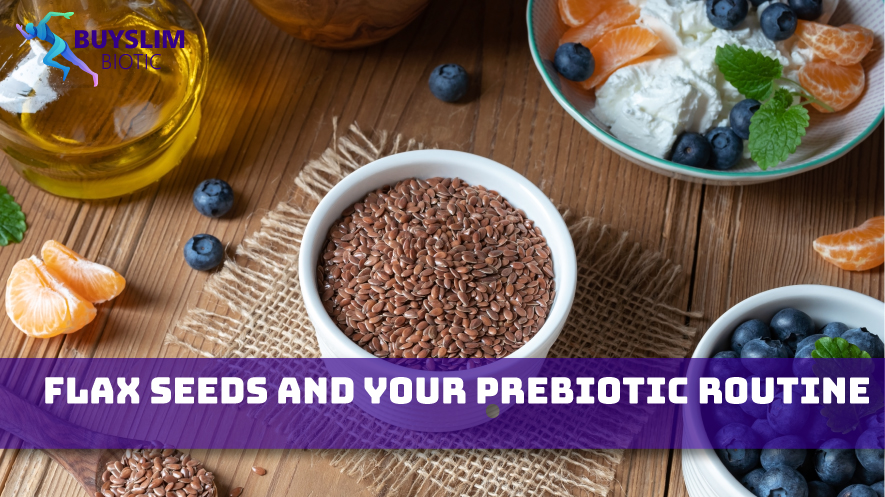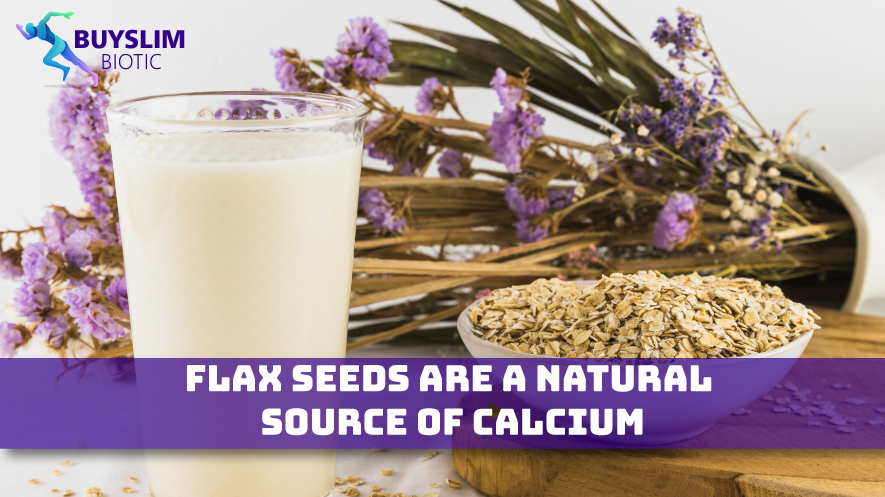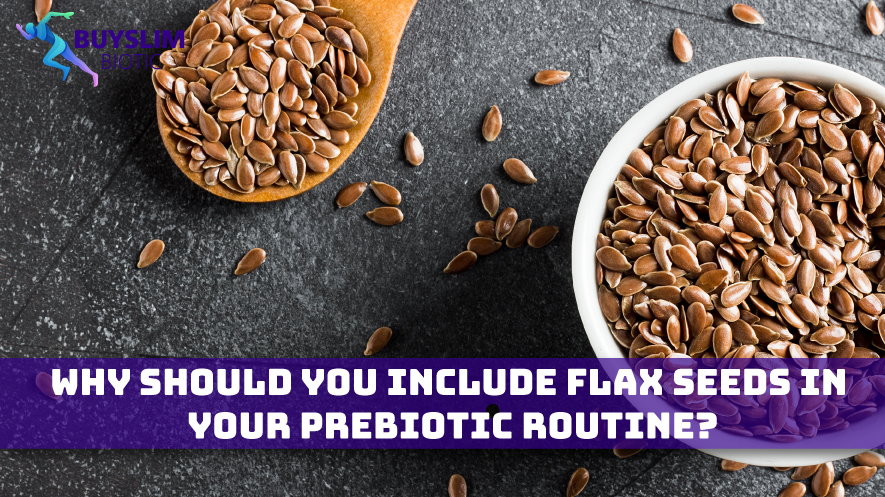Flax Seeds and Your Prebiotic Routine
Flax seeds (or linseed) are brown or golden colored seeds that are packed with health benefits. They are commonly available in the bulk food section of supermarkets or online and are used in many healthy baked goods, salads, oatmeal, smoothies etc.
They are a good source of fiber; minerals like copper, molybdenum and magnesium; and phytochemicals like lignans and stigmasterol.

1. Flax Seeds Are A Natural Source Of Omega-3
Flax seeds (Linum usitatissimum) contain high levels of omega-3 fatty acids, soluble fibre, protein and phytochemicals called lignans. They are also a good source of vitamin B1. You can find flax seeds at health food stores and online. They are available whole or ground, as well as in flax seed oil.
The dietary fibre in flax seeds helps keep the digestive system healthy. They also help to regulate blood sugar levels, which can reduce the risk of type 2 diabetes. Flax seeds are rich in the omega-3 fatty acid alpha-linolenic acid, which can lower cholesterol in the body. Omega-3 fatty acids are also believed to play a role in reducing the risk of heart disease, especially in postmenopausal women.
Eating flax seeds on a regular basis may help reduce your risk of certain cancers, as they are a source of lignans, which are a class of plant compounds that have been linked to a lower risk for conditions like osteoporosis and breast cancer. Lignans may also have anti-inflammatory properties, which can help reduce your risk of inflammatory diseases.
Flaxseeds are also a rich source of protein, which is an important building block of the body. One teaspoon of flax seeds contains nearly 2 grams of protein, which makes them a good protein-rich alternative to animal protein sources.
It’s recommended to add flax seeds to your favourite meals, such as cereal, soup, smoothie, oatmeal or salad. Just make sure to use the ground variety, as opposed to whole ones, as they tend to be more digestible. If you have kidney disease, you might want to limit the amount of flaxseeds you eat as they can be high in potassium.
2. Flax Seeds Are A Natural Source Of Fiber
The average person does not get enough fiber in their diet, and two tablespoons of ground flax seeds will give you about 15% of the recommended daily amount. This is a good amount and can help reduce constipation. The seeds are full of soluble and insoluble fiber, which together improve the health of your digestive system by helping to break down food and remove waste from the body. They also help to slow down the absorption of sugar, fat and cholesterol into your body.
Aside from being a good source of fiber, flaxseed is also one of the best plant sources of omega-3 fatty acids. These are known for their heart-healthy properties and can significantly lower blood pressure. They are also rich in lignans, which are plant compounds that act like antioxidants and can prevent disease. The lignans in flaxseeds are also known to protect against high blood cholesterol, high blood pressure and inflammation.
Flaxseeds are available whole or as a milled product called flaxseed meal, and they can be used in a variety of ways in the diet. It is important to note that whole flaxseed must be grinded or crushed before consumption, as your body cannot digest them whole. One of the reasons why is that their outer shell is tough and your intestines will not be able to break them down.
You can sprinkle ground flax seeds over oatmeal, mix them into yogurt or add them to smoothies. You can also use them to make healthy baked goods. They are also a great addition to salads, and can be mixed into meat patties for grilling. You can also try using them as a substitute for egg whites when making breakfast or dinner.
3. Flax Seeds Are A Natural Source Of Antioxidants
Flax seeds are rich in lignans and o-3 fatty acids, which act as natural anti-oxidants. They are also a good source of protein and soluble fibre. Adding two tablespoons of flax seeds or one teaspoon of flax oil daily to your diet can help provide an extra boost of nutrients and increase the nutritional value of your meals.
Nutritionists recommend that you consume flax seeds ground rather than whole as they are easier to digest and therefore absorb more of the nutrients in them. You can find ground flaxseed at most health food stores, or you can grind them yourself at home. If you choose to do this, make sure you use a coffee grinder designed specifically for grinding seeds. It will ensure that your seeds are ground evenly and to the correct size so that they will be easy for your body to absorb.
A tablespoon of ground flax seed contains about 2 grams of protein, so it is a great plant-based source of protein. It can be added to smoothies, soups, oatmeal and more. Protein is important for building and maintaining muscles, bones, cartilage, skin and hair. It is also essential for many of the bodily functions including metabolism, digestion and the production of hormones.
In addition to protein, a tablespoon of ground flax seed provides a good source of magnesium and potassium. High intakes of magnesium and potassium have been linked to a lower risk for heart disease. Potassium is also known to reduce blood clots and balance cholesterol levels. If you have kidney disease, talk to your doctor before adding flaxseed to your diet. Kidney diseases may interfere with your body’s ability to process potassium.
4. Flax Seeds Are A Natural Source Of Protein
Protein is one of the building blocks of our body and it helps to keep us feeling full, so we eat less. Flax seeds have almost 2 grams of plant-based protein per serving, making them a great source for those who are looking to add more plant-based proteins into their diets. The high amounts of soluble fibre in flax seeds also help to feed our good bacteria in our large intestine.
Adding a tablespoon of flax seeds to a smoothie, yogurt bowl or oatmeal is a simple and easy way to get more protein into your daily diet. However, whole flax seeds are difficult for the body to break down and absorb so they should always be ground before consumption to ensure you are getting all of the benefits.
The seeds are rich in heart-healthy omega-3 fatty acids, which help to lower triglyceride levels and reduce blood cholesterol. They contain a number of antioxidants that protect against inflammation and prevent plaque build-up in the arteries, lowering your risk for stroke and heart disease. The flax seeds are also a source of bioactive compounds called lignans, which have been shown to inhibit cancer tumor growth in laboratory animals.
Several studies have found that people who consume more plant-based fats and oils, such as those in flax seeds, tend to weigh less and have a healthier cholesterol profile than those who eat more animal products. These findings may be due to the fact that plant-based foods often contain fewer calories. In addition, eating more plant-based fats and oils can increase your feelings of satiety which can lead to a reduction in food intake overall. The high amount of soluble fibre in flax seeds can also help to promote regularity, decreasing your risk for constipation.
5. Flax Seeds Are A Natural Source Of Calcium
One of the best things about flax seeds is that they’re a rich source of calcium. This makes them a great addition to any prebiotic diet as they can help to improve gut health and promote healthy bones. They also provide a number of other essential nutrients like phosphorous, magnesium, potassium, and zinc.
The high amount of omega-3 and fiber in flax seeds also helps to support digestive health. They contain soluble fiber which is an excellent prebiotic and helps to feed the beneficial bacteria in your gut. This helps to reduce inflammation and encourages regularity. Additionally, the high levels of omega-3 in flax seeds help to reduce the risk of heart disease and can even lower your blood cholesterol.
In fact, one study found that consuming 30 grams of ground flaxseed per day reduced the level of cholesterol in your body by up to 11%. This is a big deal considering that high blood cholesterol can increase your risk of heart disease and stroke.
Additionally, the lignans that are present in flax seeds are also known to act as phytoestrogens and have been linked to a lower risk of cancer. They are also thought to reduce symptoms of menopause including hot flashes and vaginal dryness.
Flax seeds can be added to just about anything – from smoothies to baked goods to oatmeal. They’re easy to incorporate into your diet and can be enjoyed on their own or paired with another source of prebiotics, like a banana, for a delicious breakfast. Just remember to grind your flaxseeds before you add them to your food as whole seeds are hard for your body to digest and may pass through your intestine undigested.





